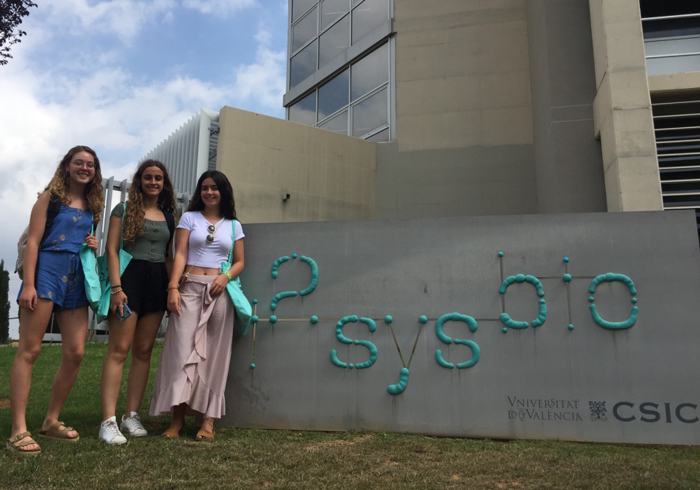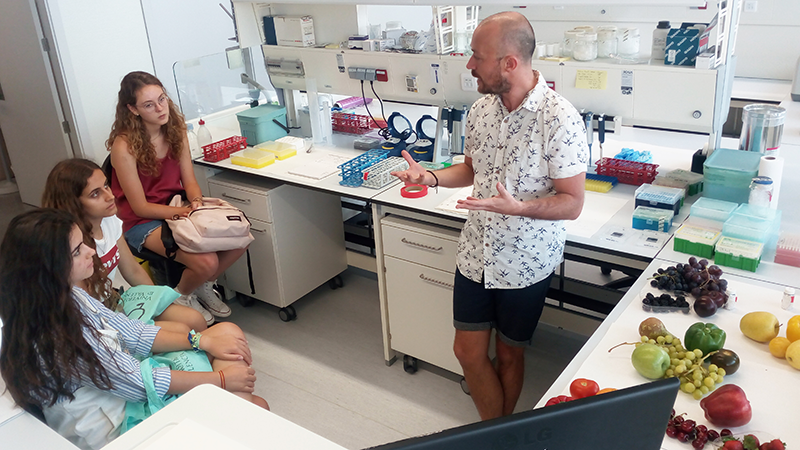Users
Social media
- More details here...
- Address
Parc Científic de la Universitat de València C/
Catedrático Agustín Escardino, 9
46980 Paterna (Valencia) Spain - Email:
iu.i2sysbio@uv.es - Phone:
(+34) 963544810
- Address
Links
Middle and high school students visit I2SysBio

Investigation
Middle and high school students visit I2SysBio

As part of the activities to disseminate the institute's research and encourage scientific vocations, we have received a visit from three high school students from the Ciència ARA program and a group of 30 high school students participating in the Summer Scientific Campus.
More than 50 high-achieving students (ARA) have participating in the 9th edition of Ciència ARA, organized by the Delegation for Incorporation to the University of Valencia. Ciència ARA is a program of scientific activities for students with high academic performance, aimed at their curricular enrichment and the development of their abilities. In addition to the Institute of Integrative Systems Biology (I2SysBio), the Higher Technical School of Engineering, the Faculty of Pharmacy, the Faculty of Chemistry and the Central Service of Support for Experimental Research (SCSIE) participate in the program.
For two days, Carla Heredia Margarit (IES María Moliner, Port de Sagunt), Alejandra Menezo López (Domus, Godella) and Isabel Vernia Garcia (La Encarnación, Sueca) have visited several I2SysBio laboratories, under the coordination of Emilia Matallana, head of ARA Science at I2SysBio. After being welcomed by José Luis García, director of I2SysBio, who introduced them to the world of systems biology, the students have immersed themselves in research as diverse as bioinformatics and "big data" in life sciences, the study of insect symbiont microbiota, the biology of pathogenic viruses, the production of aromas and colors by plants or the bioprospecting of bacteria in extreme environments. They have also visited Biopolis, a biotechnology company associated with I2SysBio. According to the students, who have a very brilliant record and who plan to start a scientific career in the field of biochemistry, biotechnology or medicine, the experience has been very motivating and has allowed them to learn up close what the day-to-day life of a university research institute is like.
On the other hand, a group of 30 4th year ESO students visited the I2SysBio as part of the Summer Scientific Campus program. This program is organized by the Ministry of Education and Vocational Training and the Spanish Foundation for Science and Technology (FECYT), dependent on the Ministry of Science, Innovation and Universities, and is aimed at young people in the 4th year of ESO and 1st year of Baccalaureate from all over Spain. The objective is to reinforce the taste for science and encourage scientific vocations. The VLC/CAMPUS campus of international excellence, made up of the Universitat de València, the Universitat Politècnica de València and the Higher Council for Scientific Research (CSIC), is part of the group of 13 campuses that host a total of 1,552 young people.
The students were received by the director of I2SysBio who stimulated a discussion with them about what it means to be a researcher, what opportunities there are to do science in our country and the value of curiosity as the driving force of all research. After introducing the main lines of research in systems biology, the students visited the institute's Data Processing Center, and were received by researchers from the Industrial Yeasts and Biotechnology and Synthetic Biology groups who explained their projects and answered the students' questions.



